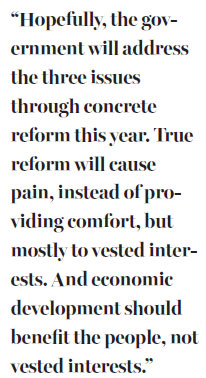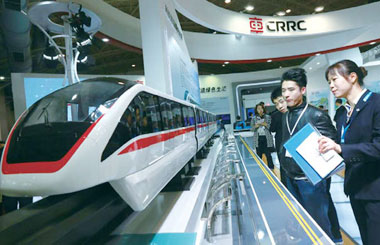Meeting the economic challenges of the year
Updated: 2016-01-22 08:38
By Wan Zhe(China Daily Europe)
|
|||||||||||
The Chinese authorities need to address three fundamental economic and governance issues this year.
First, given the mismatch between its strategic deployment and tactical design, it has to restructure the economy, and devise innovative strategies for the Belt and Road Initiative and the Asian Infrastructure Investment Bank, which will have long-term effects, on society, politics, governance and national defense.
Yet having a top-level tactical design is only the beginning, especially because China still lacks complementary practical plans to implement its strategies. Tactics should be flexible, so that they can be adjusted according to circumstances and can achieve the strategic goals.
Many parties such as industrial enterprises, financial companies and governments at various levels have adopted a wait-and-see attitude toward the Belt and Road Initiative. The huge number of files, research projects, meetings and seminars on the initiative have yielded few valuable action plans making the initiative look more like a movement than a strategy.

Also, many tactical departments are slow or reluctant to act when it comes to making implementable action plans; they talk about opportunities and gains but seldom mention the challenges, risks and losses.
Second, short-term policies will not generate truly innovative enterprises. Although China has not shown any signs of a systemic economic crisis, it still faces a progressive decline in the marginal effects of its monetary and fiscal policies, external and internal economic pressures, and a slowing economy.
Urging people to start new businesses and encouraging them to pursue innovation by, for example, making good use of the Internet may be aimed at stimulating market vitality. But that it is easy to register a new business does not mean it is also easy to make it a success. Therefore, the authorities should ensure their policies to promote entrepreneurship and innovation are targeted at the right people and industries.
The government, however, still sees the number of newly registered businesses as the most important indicator of its industrial policies, and thus ignores the impact of those that go bankrupt. In contrast, China needs new ventures that thrive on real innovations, not by buying and modeling after developed countries' technologies. Innumerable research works and long-term inputs of human and material resources, along with failures, will be needed before innovation becomes one of the driving forces of China's economy.

The need for China is to show more patience while promoting innovation, because it has paid a heavy price, in terms of the environment, for the almost three decades of double-digit growth.
And third, China's market reform, in many areas, has far outpaced that in the supervisory and administrative mechanisms and exposed the backwardness of its market supervision regime. The roller-coaster ride of China's stock market this year shows that supervision and administration lag far behind the innovation of financial tools and products.
But if that is the case, why has China's financial sector been relatively on track after the US Federal Reserve raised interest rates? The answer is: because of the government's effective countermeasures and the ongoing financial sector reform.
The number and complexity of China's financial derivatives are in the primary stage. That the government has not yet lifted its control over capital account convertibility means it still has the cover to be insulated from the storms in the outside world. But China has to take measures to shield itself from future storms, which will be much more devastating.
Freedom of market and supervision are two sides of the same coin. And effective supervision is the foundation of a secure and flexible financial market, and crucial for maximizing market reform's positive effects.
Hopefully, the government will address the three issues through concrete reform this year. True reform will cause pain, instead of providing comfort, but mostly to vested interests. And economic development should benefit the people, not vested interests.
The author is chief economist with China National Gold Group Corp. The article was first published on the website of Chongyang Institute for Financial Studies of Renmin University of China. The views do not necessarily reflect those of China Daily.
(China Daily European Weekly 01/22/2016 page13)
Today's Top News
Global push
AIIB chief vows to run clean, lean, green institution
'More Europe' to deal with 'triple crisis'
China gives beleaguered Tsipras a helping hand
China injects note of confidence in Davos
China and Gulf nations resume free trade talks
IMF starts to select new chief
Merkel insists on European solution for refugee crisis
Hot Topics
Lunar probe , China growth forecasts, Emission rules get tougher, China seen through 'colored lens', International board,
Editor's Picks

|

|

|

|

|

|






